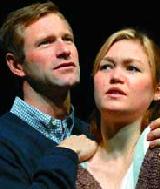SEARCH CurtainUp
REVIEWS
FEATURES
NEWS
Etcetera and
Short Term Listings
LISTINGS
Broadway
Off-Broadway
BOOKS and CDs
OTHER PLACES
Berkshires
London
LA/San Diego
DC
Philadelphia
Elsewhere
QUOTES
On TKTS
LETTERS TO EDITOR
FILM
LINKS
MISCELANEOUS
Free Updates
Masthead
NYC Weather
 London Review
London Review
Oleanna
by Lizzie Loveridge
|
John: What don't you understand?
Carol: Any of it. |

Aaron Eckhart as John and Julia Stiles as Carol
(Photo: Sarah Dunn) |
This short but intense play, less than 100 minutes including the interval, is in three parts. All acts take place in John's college office. He is a professor awaiting confirmation of his tenure, she is a final year undergraduate. The first act shows Carol asking about a paper she is worried she has failed while John is pre-occupied with telephone calls from his wife and realtor about a house he is about to buy. After initially running down university education and belittling Carol and her fellow students which makes her cry, John feels ashamed and offers to give her individual lessons so that she can not only pass the course but get an "A". The second is set after Carol has complained about John's treatment of her but before the academic committee has sat to decide what is to be done about his tenure. The final act is after the committee has come to a decision when Carol asks John to withdraw a reading list for his course which includes his own book.
The play is set at the height of the then new awareness of what constitutes political correctness. From a helpless beginning Carol uses all of the weapons in a "politically correct" and feminist-orientated arsenal to blast John and his career out of the university and out of his marriage. John is making a point about the lack of suitability for some students to be on a university course whereas Carol tells us what a personal and financial sacrifice she has made to attend university and how much she resents John's denigrating the university experience.
Lindsay Posner's interpretation of this Mamet play is a less balanced affair but makes different and maybe more significant points rather than a mere battle of the sexes. True, initially John's behaviour is unprofessional, negligent and not bearing the best interest of his student in mind but he is accused by Carol of far worse crimes. The lack of substance for her allegations skews the play so that she becomes malicious rather than merely wronged against. The result is the downfall of John, parallel to, but not as severe as that in Mamet's Edmond. Oleanna shows how suddenly and irretrievably power can shift. The opening scenes concentrate on John's power to fail his student, affecting her chance of admission to graduate school and his cavalier attitude to his professional responsibilities. By the close of the play, through distortion, Carol holds all the aces and John has not even a pair of deuces.
Neither actor really pulls off Mamet's very difficult first act. Full of unfinished sentences and interruptions, it is very hard to play it as fast as it needs to be played and still ensure that the English audience will grasp it. But your perseverance will be rewarded after the interval when the play concentrates less on academia and dry educational approaches and more on power and both actors get into the swing. Eckhart visibly starts to sink as Carol is in the ascendance. By the last act he is carelessly unshaven, his suit crumpled whereas Carol, symbolising her new found control is wearing a more formal jacket. He is desperate, she is contained. I am not sure that I ever believed in Julia Stiles' vulnerability in the first act. True she sits on the edge of her chair, her heels off the ground with the weight on her toes, tensely, but she always seems to have a determination and inner strength. Eckhart is slightly too young and too good looking for us to believe, even momentarily in his lecherous nature.
The set is a conventional modern office -- a desk, two chairs, the all intrusive phone. However, shifts in lighting create different moods, from the opening act's striking geometrical triangle of striped light and shade to a more sombre close.
| Oleanna
Written by David Mamet Directed by Lindsay Posner Starring: Aaron Eckhart and Julia Stiles Designer: Christopher Oram Lighting Designer: Howard Harrison Sound: Mic Pool Running time: One hour forty minutes with one interval Box Office: 0870 890 1104 Booking to 17th July 2004. Reviewed by Lizzie Loveridge based on 23rd April 2004 at the Garrick Theatre, Charing Cross Road, London WC2(Tube/Rail Station: Charing Cross) |


Mendes at the Donmar
Our Review

Peter Ackroyd's History of London: The Biography

London Sketchbook

Retold by Tina Packer of Shakespeare & Co. Click image to buy.
Our Review

6, 500 Comparative Phrases including 800 Shakespearean Metaphors by CurtainUp's editor.
Click image to buy.
Go here for details and larger image.
